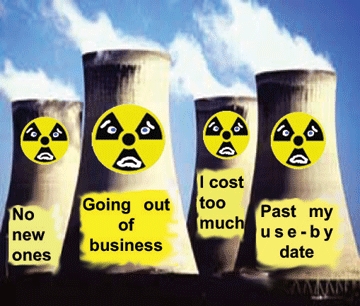Search
Democracy Links
Member's Off-site Blogs
shut down ....
By all signs, it appears that the whole of planet Earth has at once decided to shun nuclear energy. The popular sentiment was definitely negative towards the use of nuclear power, and now it seems that governments have had to bow to people’s wishes.
Within one week, the industry has been dealt such a severe body blow that it will have to struggle hard to even survive. Let us take a look at the week’s news:
Japan will phase out nuclear power – Japan’s decision to end its reliance on nuclear power by the 2030s means it will join the ranks of countries such as Germany, Italy and Switzerland in turning away from nuclear power after last year’s Fukushima disaster. Given that Japan has 30 percent dependence on nuclear power and the Japanese government stand that the restart of the nuclear plants was inevitable, this decision is a major policy reversal. It comes after strong and sustained peoples protests against the government policy.
In Belgium, after indications of cracks were found in their reactor vessels, two reactors have been shut down indefinitely and the prospects of their restart appear dim.
Spain meanwhile said that it will close its Garoña nuclear power plant in July 2013 by not renewing the plants license to operate.
In France, President Hollande is pushing for decommissioning its oldest reactor at Fessenheim. Meanwhile, the ruling socialist in France wants to reduce dependence on nuclear power for energy to 50 percent from 75 percent by 2025.
In Canada, Quebec’s new government has confirmed it will also close the Gentilly-2 nuclear reactor after a coalition of activists opposed the plants continued operation and demanded its closure on safety grounds.
In the United States, the San Onofre Nuclear power station in California looks set for permanent closure since being shut down for the past nine months following radioactive leaks which resulted from shoddy engineering.
If one adds the fierce opposition to the start of the Koodankulam Nuclear Power Plant in southern India, the future of the nuclear energy industry itself is at stake.
Long accustomed to shoving its way out of trouble by using a mix of mis-information, powerful lobbying, and other dubious means, the industry is now faced with a popular dissent from the citizens of the countries it operates in.
This will be difficult, if not impossible, to conquer. After all, Governments depend on their voters to get them elected to power and going against such a vociferous and strident people’s movement would mean certain electoral losses. No government in its right mind would want to take such a suicidal step.
- By John Richardson at 18 Sep 2012 - 7:07am
- John Richardson's blog
- Login or register to post comments

Recent comments
4 hours 59 min ago
14 hours 13 min ago
14 hours 27 min ago
1 day 1 hour ago
1 day 6 hours ago
1 day 10 hours ago
1 day 11 hours ago
1 day 11 hours ago
1 day 13 hours ago
1 day 13 hours ago